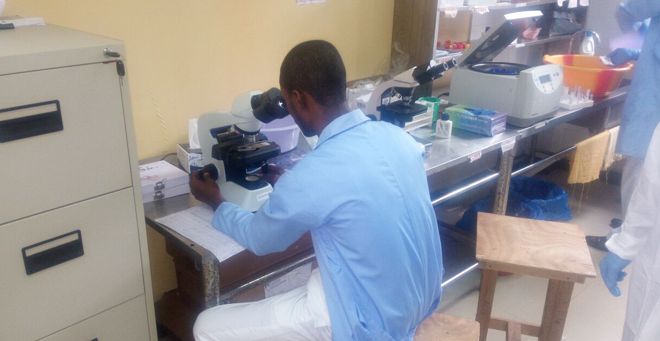 |
|
|
An employee works in the Tappita Hospital Lab in Nimba county Liberia. |
David Chiriboga, MD, MPH, assistant professor of medicine, and colleagues will provide an update on UMass Medical School’s work to strengthen health care services in Liberia in the wake of the Ebola outbreak. The event will take place on Monday, Nov. 19, at noon, in the Albert Sherman Center auditorium.
Dr. Chiriboga is the principal investigator for the UMMS-led Academic Consortium Combating Ebola in Liberia (ACCEL) project, in partnership with the Liberia College of Physicians and Surgeons and with funding from the U.S. Centers for Disease Control and Prevention. The ACCEL project team works alongside the Liberia Ministry of Health to equip, train and mentor Liberian health care workers to improve their capacity in the wake of the West African Ebola epidemic. Key focus areas for the ACCEL project include infection control at public health facilities, Ebola diagnostic testing, and blood collection and transfusion practices.
Panelists for the discussion will include Roseda Marshall, MD, ACCEL project country director for the Liberia College of Physicians and Surgeons; Ellen Munemo, MSc, ACCEL project programs director at UMMS; and John Oguda, MBA, ACCEL project deputy country director at UMMS.
Since August 2016, UMMS has received $14.7 million from the CDC in support of the ACCEL project. The first year of the grant largely focused on improving facility-level infection prevention and control, along with lab and blood facility equipment acquisition and training. With guidance and support from UMMS/ACCEL and the CDC, the Liberian Ministry of Health adopted a tiered public health laboratory approach to increase the diagnostic capabilities of labs throughout the country. The newly developed capacity increases the capability for identifying for Lassa fever, meningitis, shigellosis and salmonellosis, as well as Ebola. The new lab system is being considered for international accreditation.
A similar tiered system was established for blood transfusion and donation safety, capped by the recent adoption of the National Blood Safety Policy, a document that ACCEL was instrumental in creating. The next phase in includes development of a five-year strategic plan for blood safety in Liberia.
The event is Monday, Nov. 19, with a reception preceding at 11:30 a.m. in the multipurpose room of the Albert Sherman Center. The presentation is scheduled for noon in the Sherman Center auditorium. (Please RSVP to globalhealth@umassmed.edu if you intend to attend the reception.)